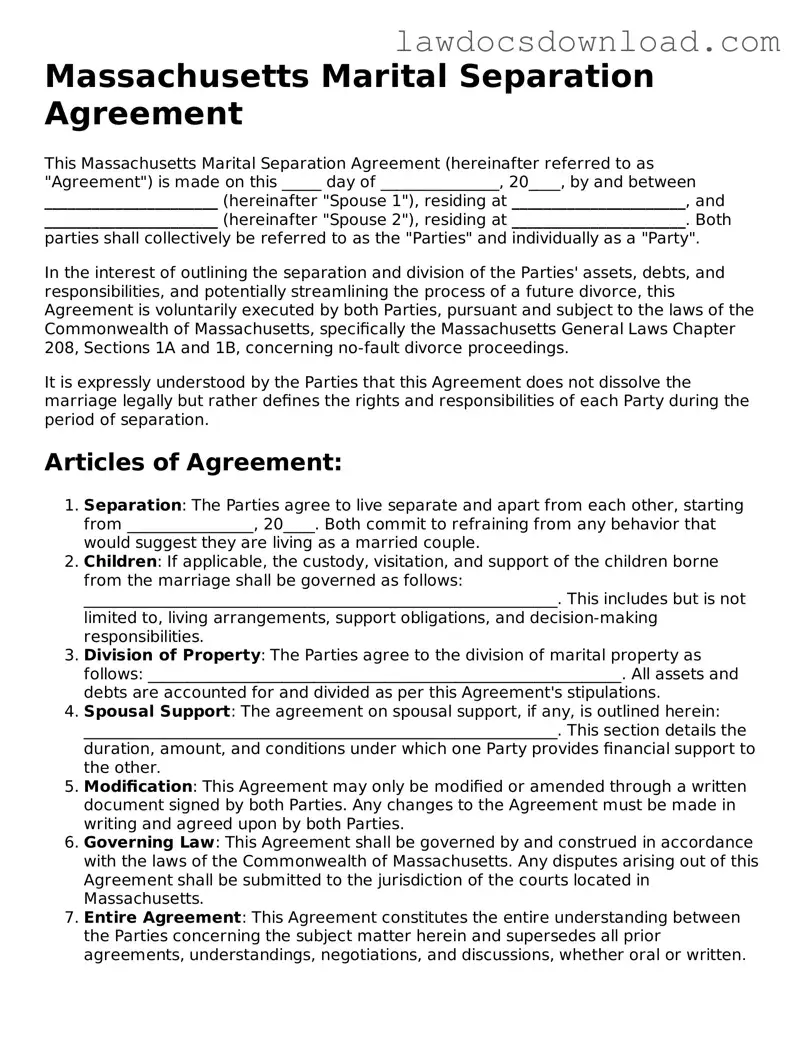When couples in Massachusetts decide to separate, the process of filling out a Marital Separation Agreement form is a crucial step. This document outlines the terms of the separation, including division of assets, child custody arrangements, and spousal support. However, the complexity of legal forms can lead to several common mistakes that can have long-lasting effects on both parties involved.
One common mistake is not fully disclosing financial information. It's essential for each party to provide a complete and accurate disclosure of their finances, including income, assets, and debts. Failure to do so can result in an unfair division of property or support obligations, and can even lead to legal actions for fraud if the omission is discovered after the agreement has been finalized. This transparency ensures that the agreement is based on accurate information, leading to a fairer outcome for both individuals.
Another error often made is overlooking future needs and potential changes. When drafting a Marital Separation Agreement, it's crucial to consider not only the current situation but also potential future changes in circumstances, such as changes in income, health issues, or the needs of any children involved. Without considering these factors, individuals may find themselves bound by an agreement that no longer serves their or their children's best interests, which can be particularly problematic in terms of spousal or child support.
A third mistake is neglecting to specify dispute resolution mechanisms. Conflict might arise after the agreement is in place, related to its interpretation or implementation. By not specifying how disputes will be resolved, parties leave themselves open to prolonged and costly court battles. Including a clause for mediation or arbitration can save both time and money, helping to resolve any future disagreements in a more amicable and efficient manner.
Additionally, there is often a failure to comprehensively address all necessary areas. A Marital Separation Agreement should thoroughly cover all relevant issues, including division of property, child support, custody, alimony, and any other specific considerations relevant to the unique circumstances of the separation. Omitting any key areas can lead to misunderstandings, future disputes, and the need for further legal intervention, adding to the emotional and financial strain on both parties.
Lastly, a significant mistake is rushing through the process without seeking legal advice. While filling out the form might seem straightforward, the legal and financial ramifications of a Marital Separation Agreement are profound. Without consulting a legal professional, individuals risk agreeing to terms that are not in their best interest or legally sound. Legal advice is invaluable in ensuring that the agreement is fair, balanced, and complies with Massachusetts law, ultimately protecting the rights and futures of both parties.
In conclusion, while the task of completing a Marital Separation Agreement form in Massachusetts is a critical step toward a new beginning, it's fraught with potential pitfalls. By being mindful of these common mistakes and seeking appropriate legal counsel, individuals can navigate the process more smoothly, ensuring that the agreement reached is fair, comprehensive, and sustainable for the future.

